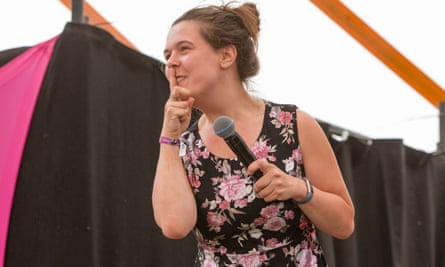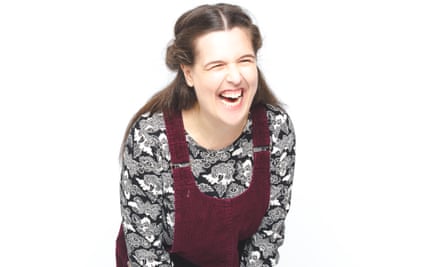A Great British, Female, Gay, Disabled, Covid-Compliant Adventure was the original name for Rosie Jones’s new travel show. “But,” says its host, “we thought that when you’ve got a presenter who speaks slowly, introducing that would take all bloody day.” She also might have called it Stereotypically Shit Places, another phrase bandied about in today’s Zoom chat. “The idea,” she says, “was to visit places where the local people would go: ‘Why have you come to Whitby for your holiday?!’” In the end, Channel 4 settled on Trip Hazard: My Great British Adventure. The four-part series, about comedian-of-the-moment Jones “going to shit places and making the most of it”, premieres this spring.
It is, says Jones, “the first show I’ve done where I’m the head of it”. Silly, smart and narrated by Olivia Colman, it is unlikely to be the last. While the last 12 months have been an unmitigated disaster for most live comedians, Jones’s star has kept rising, and the work keeps rolling in. OK, so her gig at the prestigious Melbourne comedy festival was nixed, and a Tokyo Paralympics presenting role went south. But, she says, “I’ve not stopped working. I’ve been writing a book. And I’ve gone out and filmed a primetime Channel 4 travel show. I feel like the luckiest person in comedy.”
The aforementioned “speaking slowly” is a symptom of her ataxic cerebral palsy, which also affects her movement. She once ruled out a career performing comedy “because people would get to my punchlines before I did”. When she worked out how to use this to her advantage, delivering in her own sweet time far more subversive punchlines than the audience expected, a standup career took flight.
Having cut her teeth working in TV production, and as a writer on shows such as The Last Leg, Jones is now a fixture on the starrier side of the cameras. She’s done Live at the Apollo, has her own BBC Radio 4 standup vehicle Box Ticker, and even acquired that essential notch in any modern comic’s bedpost – spurious outrage – when an “inappropriate” gag about Greta Thunberg got Twitter in a lather a year ago.

While she had a dry run at travelogues with the C4/YouTube series Mission: Accessible, which gauged disability access at various UK attractions, Trip Hazard is the first show she has fronted that doesn’t make an issue of her disability. “There’s the odd comment,” she says, “but this is not ‘a disabled person goes around the country’. That’s just a given.”
The idea instead was to make a travel show for the lockdown era. “I live in London,” says Jones. “But during lockdown I moved back to Yorkshire with my mum and dad. I grew up in a seaside town [Bridlington] that I spent 18 years hating. But coming back as an adult, I was like: it’s quite beautiful.”
The show takes Jones around the country with a succession of celebrity pals, visiting places that exist in that Venn diagram where crap and fantastic meet. “You hear the word ‘Norwich’,” says Jones, “and, even though I’d never been there, I thought, well, no.”
Trip Hazard also spoofs travel show convention, splicing Rosie’s jaunts with behind-the-scenes pow-wows with her crass commissioning ed, played by fellow comic Rachel Stubbings (“You tick a lot of boxes: woman, disabled, gay, northern”). The 30-year-old says she drew on personal experience of what she coyly refers to as “some challenging commissioners with interesting thoughts”. The upshot is droll, easy-watching TV, in which Jones zip-wires across Anglesey with Jenny Eclair, fossil hunts with Joe Wilkinson, and sleeps in awkward proximity to the equine residents of a Lake District stable.
The four episodes were filmed back-to-back in just a fortnight, a gruelling schedule that condemned Jones to four days’ convalescence in her Bridlington bed. Like her comedy, characterised by ebullience and enthusiasm, Jones’s regimen might appear to make light of the challenges faced by a person with her disabilities. She’s aware of that danger, and alert to her responsibilities (as she sees them) to represent disabled people while always being more than just a disabled person herself.

The most striking example in her live work came in 2019’s show Backward. There, after 55 cheerful minutes of wanking gags and jokes about auditioning for street-dance troupe Diversity, Jones pivots to a discussion of how she’s greeted by strangers in the street: with affection by those who recognise her, but often with abuse by those who don’t. Such is life for disabled people in modern Britain – a point she made with even greater force on BBC One’s Question Time last November, when she found herself mano a mano with Matt Hancock.
“I’ve never, ever been so nervous,” she says now. “But I was determined to take the opportunity to say to him: ‘What are you and your government doing for disabled people? Because right now, six in 10 people who’ve died from Covid have been disabled.’ And to hold him accountable for disabled people’s unemployment, having their benefits taken away. Right now, this is not a good country if you’re a disabled person.”
Her appearance made headlines and won plaudits. “Then 48 hours went by, and everyone forgot it. Something else comes along and disabled people get ignored and overlooked again.”
It’s with that in mind, perhaps, that she focuses more on representation than activism. For Jones, it’s inherently political for her simply to be, as a prominent comic, writer and presenter who also happens to be disabled. That’s the impetus behind her forthcoming new children’s book, The Amazing Edie Eckhart, about a girl with cerebral palsy. The idea, of course, is to give disabled readers (and able-bodied ones) a heroine who “may walk a bit funny but is otherwise just like everyone else”.
There were no such heroines available to Jones as a kid. “And, looking back,” she says, “it had long-term effects, to open all those books, to turn on the telly, and never see someone like myself. I told my mum recently, when I used to envisage my adulthood, it was just me working at a corner shop that mum and dad could drive me to and pick me up from. I couldn’t ever imagine living on my own and having a job that I wanted to do. Because I never saw it.
“Then later, when I started working in TV, I was nearly always the only disabled person working on a production. And now I’m in comedy myself, on most panel shows, if there’s a disabled person, it’s normally me. Which is great for me!” she laughs. “But I would love in the next few years to see more disabled comedians, directors, producers, commissioners. I hope disabled people can see me on TV and think: if she can do it, I can do it.”
If they’re not inspired by the prospect of an all-expenses-paid holiday to Norwich …
“I know!” hoots Jones. “I mean, what more do they want?”
Trip Hazard: My Great British Adventure starts on Friday 9 April on Channel 4
